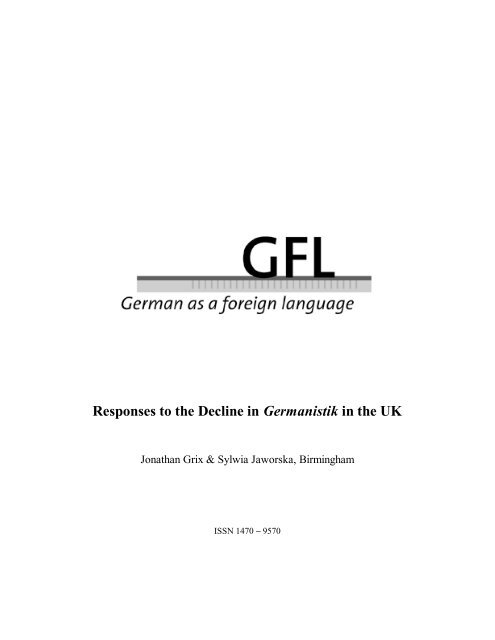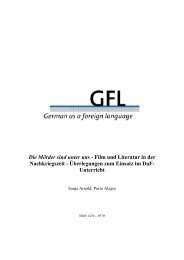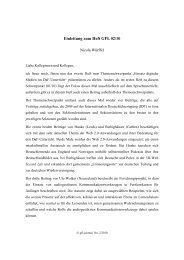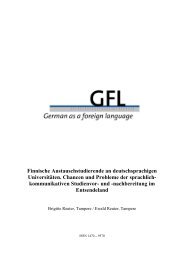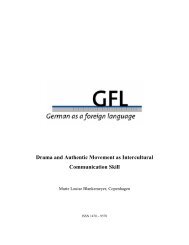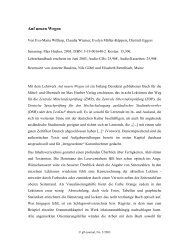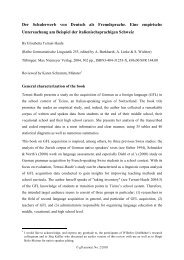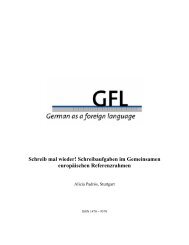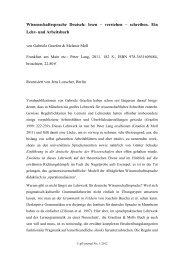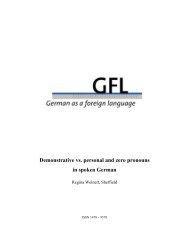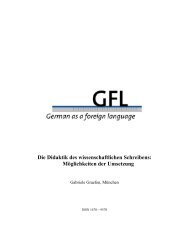Jonathan Grix & Sylwia Jaworska, Birmingham - GFL-Journal
Jonathan Grix & Sylwia Jaworska, Birmingham - GFL-Journal
Jonathan Grix & Sylwia Jaworska, Birmingham - GFL-Journal
Create successful ePaper yourself
Turn your PDF publications into a flip-book with our unique Google optimized e-Paper software.
Responses to the Decline in Germanistik in the UK<br />
<strong>Jonathan</strong> <strong>Grix</strong> & <strong>Sylwia</strong> <strong>Jaworska</strong>, <strong>Birmingham</strong><br />
ISSN 1470 – 9570
Responses to the Decline in Germanistik in the UK<br />
1<br />
Responses to the Decline in Germanistik in the UK<br />
<strong>Jonathan</strong> <strong>Grix</strong> & <strong>Sylwia</strong> <strong>Jaworska</strong>, <strong>Birmingham</strong><br />
The purpose of this paper is to outline and establish the decline in interest in so-called<br />
‘traditional’ German studies in universities in the UK. The authors discuss the shift in the<br />
German studies paradigm in the UK during the last 20 years and set about pegging out the<br />
variety of conceptual approaches to studying the topic that exist at present. In addition, they<br />
present two new models of German studies that can be seen as direct responses to declining<br />
tertiary-level applicants. This paper intends to contribute to the on-going debate on the future<br />
of German studies per se by suggesting that there is a need for practitioners of all the varying<br />
approaches to the study of Germany to accept, and indeed welcome, other ways of ‘doing’<br />
German studies.<br />
0. Introduction<br />
The following article introduces two approaches to the study of Germany that can be<br />
understood as direct responses to the decline in ‘traditional’ German Studies in the UK.<br />
Before we even begin our discussion, however, even this phrase poses a number of<br />
problems. It would seem that all subject designations that contain the word ‘studies’ suffer<br />
from a lack of legitimacy. ‘General Studies’, for example, is looked upon as an easy ‘A’<br />
level to take, whilst ‘Soviet Studies’ or ‘Classical Studies and ‘Area Studies’ are<br />
notoriously difficult to define. In order to ascertain whether we are experiencing a decline<br />
in German Studies and to outline the responses to this, we need to agree on just what<br />
constitutes German Studies. If, for now, we simply focus on the subject taught at ‘A’ level<br />
in schools (that is, ‘advanced level’ courses traditionally taken at 18 and considered the<br />
prerequisite for university entrance) and at degree level in the UK, there is no denying the<br />
rapid decline in students’ interest in recent years. In line with a decline in language study<br />
across the board at these levels (less marked, however, for Spanish), German departments<br />
in universities across the country are finding it increasingly hard to recruit good quality<br />
students. In the ‘European Year of Languages’, 2001, the British were officially deemed to<br />
possess the worst command of languages in the whole of Europe (Guardian Newspaper,<br />
February 20 th , 2001, p. 6) with 66% of the population admitting to possessing no<br />
knowledge of a foreign language whatsoever. Whilst 22% of Britons claim to have some<br />
© gfl-journal, No. 3/2002
<strong>Jonathan</strong> <strong>Grix</strong> and Silwia <strong>Jaworska</strong><br />
2<br />
knowledge of the French language, only 10% claimed the same for German. Moreover,<br />
among up-and-coming students the trend for language learning is decidedly downwards, as<br />
is reflected in the applications to German degree programmes discussed below.<br />
The decline in student interest in studying degree-level German chimes with the<br />
experiences of many western European countries and the USA. Interestingly, there appears<br />
to be a bifurcation in Europe between those (western) countries in which German Studies,<br />
in particular the ‘traditional version’ (see below), is dying out and those (east European)<br />
countries in which students are breaking down the doors to study the language and country<br />
of Goethe. The former countries, including the UK, France, Belgium and the Netherlands<br />
are linked by a common affliction: declining numbers of students taking German. The latter<br />
are linked by the opposite: flourishing German programmes with eager students.<br />
Paradoxically, eastern European (and, incidentally Russian) institutions, with their pent-up<br />
demand for learning the language of the European Union’s major player, tend to orientate<br />
themselves towards a model of German Studies that has gone from the majority to the<br />
minority in the west European countries cited (and the USA). 1 The paradox lies in the fact<br />
that many of the countries suffering a decline in German student numbers, including<br />
Britain, have gradually developed alternatives alongside the traditional Germanistik type of<br />
German Studies, for a number of intellectual and pragmatic reasons, not least of all with the<br />
intention of reversing the declining trend.<br />
This article begins by presenting some statistical data on the decline in interest in German<br />
Studies among ‘A’ level students and degree applications in the UK. This is discussed in<br />
relation to other languages, especially French and Spanish. Section 2 outlines the<br />
development of approaches to German Studies in higher education in Britain,<br />
differentiating three broad paradigms: the first, the so-called ‘traditional’ paradigm, is<br />
derived from the practice of Germanistik in Germany; the other two, ‘Cultural Studies’ and<br />
‘Area Studies’, have come about due to a number of factors discussed below. An attempt<br />
will be made at clarifying the differences between these varieties of German Studies and at<br />
1<br />
Much of this information has been gleaned from a round of three special workshops on the<br />
future of German Studies held in Montreal, Sofia and Bremen respectively and sponsored by the<br />
DAAD at which <strong>Grix</strong> presented drafts of part of this paper. In addition, <strong>Grix</strong> (2002) highlights<br />
some of the arguments put forward in the latter section of this paper.<br />
© gfl-journal, No. 3/2002
Responses to the Decline in Germanistik in the UK<br />
3<br />
explaining the shift in paradigm away from the more traditional to the plurality of<br />
approaches that now exist.<br />
Section 3 focuses on two specific responses to the decline in German Studies in the UK.<br />
These can be seen as injecting new life into the old debate of what constitutes German<br />
Studies. First, we outline the model employed by the Institute for German Studies at<br />
<strong>Birmingham</strong> University, which, whilst concentrating solely on postgraduate research,<br />
nonetheless offers an alternative model of German Studies for undergraduate programmes<br />
that complements the ‘traditional’ and ‘Cultural Studies’ models already in existence.<br />
Subsequently, Aston University’s model of an ‘integrative’ approach to German Studies is<br />
introduced and discussed. All in all, these models can be viewed as adding a new<br />
dimension to the debate on the nature and future of German Studies in the UK. It must be<br />
stressed that the following debate is intended to enrich the notion and practice of German<br />
Studies in the UK and in no way are the models presented here to be put forward as<br />
‘superior’ to any other type of German Studies currently practiced.<br />
1. The Decline in Germanistik in the UK 2<br />
The alarming decline in the field of German Studies within the UK is not a new problem.<br />
Even though the unification of Germany contributed to a rapid increase of interest in<br />
German culture and language, ‘the wave of euphoria’ 3 was soon to give way to a decline in<br />
the number of applications to study German at tertiary level and thus a decreasing pool of<br />
students for departments to choose from. However, the problem was not only a Germanrelated<br />
one. The crisis of German Studies was part of the wider difficulties felt by the<br />
whole modern languages sector in recent years, 4 which saw other language departments<br />
(for example, French, Spanish, Italian and Russian) also face a drastic decrease in student<br />
2<br />
3<br />
4<br />
This contribution on the development of German Studies in the UK can seen as part of the<br />
ongoing discussion in <strong>GFL</strong>. It follows the articles by N. Reeves (<strong>GFL</strong> 1/2000), N. Pachler (<strong>GFL</strong><br />
2/2001) and G. Reershemius (<strong>GFL</strong> 3/2001).<br />
Weber (1997).<br />
See the Nuffield Languages Inquiry, http://www.languagelearn.co.uk/nuffield.htm.<br />
© gfl-journal, No. 3/2002
<strong>Jonathan</strong> <strong>Grix</strong> and Silwia <strong>Jaworska</strong><br />
4<br />
numbers and applications for a single honours degree, 5 (that is, a university programme<br />
followed by students studying one subject). There appears to be more stability in joint<br />
honours however, (that is, where students simultaneously study two subjects at university)<br />
although this can also lead to language departments being seen as service teaching<br />
departments for English, Law, Politics and so on.<br />
Before turning our attention to the university sector, it is instructive to see the language<br />
learning trends at GCSE 6 and ‘A’ levels, which is, after all, where the vast majority of<br />
degree-level students come from. There is no doubt that the root of the decline in language<br />
acquisition is to be found here, for, even though ‘there is an enthusiasm for languages (…)<br />
educational provision [in the UK] is fragmented, achievement poorly measured, [and]<br />
continuity not very evident.’ 7 Foreign languages are often interpreted as optional subjects<br />
by some schools at key stage 4 8 , underlining the fact that the UK lacks a coherent national<br />
agenda on language provision. If the proposals set out in the recent Government Green<br />
Paper were to be implemented, we would witness a massive decline in language students at<br />
all levels from GCSE to PhD. The intention is to drop languages from the compulsory<br />
curriculum for 14-16-year-olds. As the British Academy correctly suggest<br />
At present (2002), the numbers taking A level, first degree, postgraduate and teacher<br />
training qualifications in languages are insufficient to meet the UK’s current need for<br />
qualified linguists. These difficulties will become even more extreme if languages cease to<br />
be a requirement from 14 to 16. 9<br />
A lack of qualified teachers and low motivation among those teaching are also contributing<br />
factors to the state of language learning in UK schools. As far as studying German is<br />
5<br />
6<br />
7<br />
8<br />
9<br />
Plomin (2001).<br />
That is, the General Certificate of Secondary Education, which acts as the principal means of<br />
assessing pupil attainment at the end of compulsory secondary education at 16.<br />
See the Nuffield Languages Inquiry, http://www.languagelearn.co.uk/nuffield.htm.<br />
Around the age of 14, children are at ‘key stage 4’ in their education and are able to make<br />
choices regarding the subjects they study.<br />
See the official government document ‘Language Learning’ at<br />
http://www.dfes.gov.uk/14-19greenpaper/download/DfES-LanguageLearning.pdf.<br />
Also, for a measured response to the government’s proposals see the British Academy’s website,<br />
http://www.britac.ac.uk/news/ reports/0206languages2.html<br />
© gfl-journal, No. 3/2002
Responses to the Decline in Germanistik in the UK<br />
5<br />
concerned, the limited contact with the language and culture has accelerated the decrease in<br />
student numbers at degree level, leading Timothy McFarland to suggest that:<br />
Young British people do not come into enough contact with the subject - they are not<br />
encouraged to pursue German Studies as a result of their social milieu and in schools German<br />
has lost ground, above all in relation to Spanish. 10<br />
The downward trend is clearly borne out by the facts and figures. While the National<br />
Curriculum made the learning of a foreign language compulsory at GCSE level and thereby<br />
contributed to a rise in language learners, at ‘A’ level pupils have been increasingly<br />
allowed to make a choice and choose they do (see diagram 1), underlining the finding that<br />
nine out of ten children see learning language as irrelevant and cease pursuing it at 16. 11<br />
140.00<br />
120.00<br />
100.00<br />
80.00<br />
60.00<br />
40.00<br />
GCSE- level<br />
A- level<br />
20.00<br />
0.00<br />
1990, 1992 1997, 1999<br />
Diagram 1: Entries for GCSE and A Level in German in the UK, 1990 -1999 (1000s)<br />
Source: CILT Yearbook 2000<br />
It would seem that work is needed in persuading pupils of the benefits of learning<br />
languages to reverse the huge drop in numbers of those taking GCSE who go on to take A<br />
levels, as the leap in numbers of those taking GCSE German between 1990 and 1999,<br />
paradoxically, translates into fewer students taking ‘A’ levels.<br />
Applications to study a subject are a fair indication of a subject’s health. The diagram<br />
below shows the number of total applications to three of the most widely taught languages<br />
10<br />
11<br />
McFarland (1998).<br />
Nuffield Languages Inquiry, http://www.languagelearn.co.uk/nuffield.htm,<br />
© gfl-journal, No. 3/2002
<strong>Jonathan</strong> <strong>Grix</strong> and Silwia <strong>Jaworska</strong><br />
6<br />
(both single and joint honours) lodged between 1994 and 2000 in Departments for Modern<br />
Languages throughout the UK. 12<br />
60.00<br />
50.00<br />
40.00<br />
30.00<br />
20.00<br />
French<br />
German<br />
Spanish<br />
10.00<br />
0.00<br />
1994 1996 1998 2000<br />
Diagram 2: Applications to study German, French and Spanish, 1994-2000 (1000s)<br />
Source: data obtained from the University and Colleges Admissions Service (UCAS), the<br />
UK central organisation through which applications are processed for entry to higher<br />
education. Also available at: http://www.ucas.ac.uk/figures/archive/subject/index.html<br />
The statistics reveal a clear decline in interest in modern languages among would-be<br />
undergraduate students. Spanish is the only language that has maintained a consistent level<br />
of applications, in part due to its growing importance as a language for business partners in<br />
the UK and the attractiveness of the Spanish speaking countries, including South and<br />
Central America, as holiday destinations. Furthermore Spanish is perceived as an easy<br />
language to learn. 13 What is apparent from the German figures is that even though Germany<br />
is considered the second language in the European Union and that Germany is the UK’s<br />
biggest trading partner, the figures are declining. Applications fell steadily and declined to<br />
12<br />
13<br />
Data were obtained from UCAS. Also available at<br />
http://www.ucas.ac.uk/figures/archive/subject/index.html, last updated November 11 th , 2000.<br />
McVeigh (2001).<br />
© gfl-journal, No. 3/2002
Responses to the Decline in Germanistik in the UK<br />
7<br />
11,617 in 2000 (and 11,198 in 2001) from almost 23,000 in 1994. 14 The diagram illustrates<br />
that although French also lost almost 50% of its applications between 1994 and 2000<br />
(57,639 down to 28,441), it still remains the leading second language in Higher Education<br />
in the UK, a reflection of its privileged place in UK school curricula. Interestingly, the stark<br />
drop in applications for modern language courses has not translated into a stark drop in<br />
students accepted onto degree programmes, but rather departments have been forced to take<br />
on students with lower grades and those with ‘A’ levels in subjects other than the target<br />
language. In fact, an alarming decline in the language skills of pupils entering university<br />
was one of the consequences of this trend, with 1 st year students of German unable to fulfil<br />
the requirements of traditional German Studies 15 . They were also less and less interested in<br />
studying the traditional subjects like literature or Middle High-German. This is one reason<br />
why some departments reduced their literature programmes, offered ab initio language<br />
tuition and concentrated more on German history, society, institutions and media in the<br />
20th century 16 (see below for a further discussion of this.) The figures below illustrate the<br />
percentage of accepted applications between 1994 and 2000, using 1994 as the base year<br />
(100%).<br />
Thus, while overall applications to study German is down by over 50% between 1994 and<br />
2001, those accepted onto courses over the same period fell by 30%, 17 meaning that<br />
somewhere along the line standards must have dropped. We need to bear in mind also the<br />
fact that the majority of students choose German in combination with another subject, with<br />
only a minority choosing to study German as a single honours degree option. If, as seems<br />
very likely, the trend of declining applications continues in the future, standards will almost<br />
certainly have to drop further to sustain remaining German departments. It is against this<br />
backdrop of gradual decline that the following discussion takes place.<br />
14 2001 figures from Professor David Robey, www.lang.ltsn.ac.uk/ucas_langs_stats_2002.rtf.<br />
15<br />
Reershemius (2001).<br />
http://www.gfl-journal.de/downloads/3-2001/reershemius.html.<br />
16<br />
Weber (1997).<br />
17 2001 figures from Professor David Robey, http://www.lang.ltsn.ac.uk/ucas_langs_stats_2002.rtf.<br />
© gfl-journal, No. 3/2002
<strong>Jonathan</strong> <strong>Grix</strong> and Silwia <strong>Jaworska</strong><br />
8<br />
120%<br />
100%<br />
80%<br />
60%<br />
40%<br />
French<br />
German<br />
Spanish<br />
20%<br />
0%<br />
1994 1996 1998 2000<br />
Diagram 3: Applications (in percent) accpeted for modern language courses, 1994 -2000<br />
Source: data obtained from UCAS<br />
Also available at http://www.ucas.ac.uk/figures/archive/subject/index.html<br />
2. Approaches to German Studies in the UK<br />
The first thing to clarify before discussing the types of approaches to German Studies in the<br />
UK is that we are not talking about a discipline. Academic disciplines are based on certain<br />
sets of ontological and epistemological assumptions, although within disciplines there is a<br />
wide variety of differing views among academics on which methods, theories, practices and<br />
concepts are the most suitable. 18 German Studies, or Cultural and Area Studies for that<br />
matter, are not glued together by general or specific methodologies in which competing<br />
paradigms, consisting of common terminology and theories, coexist. The difficulty in<br />
discussing and attempting to define German Studies is made worse by the fact that<br />
academic disciplines themselves, even those that see themselves as more ‘scientific’ like<br />
economics, consist of a wide variety of approaches, theories, preferred methods and<br />
methodologies. At times it would seem that different disciplines speak a different language<br />
18<br />
See <strong>Grix</strong> (2001).<br />
© gfl-journal, No. 3/2002
Responses to the Decline in Germanistik in the UK<br />
9<br />
or discourse when describing the same event, so what chance have we of nailing down the<br />
elusive concept of German Studies?<br />
One thing is clear, however, that no one agrees on just what constitutes ‘German Studies’.<br />
For this reason it is useful to unpick the wide variety of ways in which the term is<br />
conceived. This in turn will help place the two varieties discussed in this paper within the<br />
broader context of German Studies as it is practised in the UK.<br />
The British Context: The Dominant ‘Traditional’ Paradigm<br />
German Studies in Britain as an area of study has traditionally been the reserve of language<br />
and literary studies experts and derives directly from the German field of Germanistik. This<br />
was particularly reflected in the content of university degrees around the country, which<br />
saw a division between Oxbridge (that is, the universities of Oxford and Cambridge), where<br />
the focus was mainly on literature and the year abroad was (until recently) optional, and<br />
traditional departments in which the study of literature and language as a vehicle of<br />
accessing the target country’s culture took up the bulk of the curriculum. There was room<br />
for the study of historical varieties of the German language, e.g., Middle High-German, and<br />
for probing the depths of German verse throughout the preceding centuries. Students<br />
studied in depth a wide range of German literary texts, from the medieval ‘Minnesang’<br />
through to the modern period, which generally meant stopping at the start of the 20 th<br />
Century. This German Studies paradigm we term ‘traditional’. The point of this paradigm<br />
was, generally speaking, to submerge students in German literature, culture and, outside<br />
Oxbridge, in language. Even though the traditional approach focused on linguistic accuracy<br />
and high proficiency in written and spoken language, the methods applied did not always<br />
have a positive effect on the improvement of fluency and accuracy. This was due partly to<br />
the fact that the foreign language was not used as a means for teaching and transferring<br />
knowledge. The language of the classroom was English; students in many cases became<br />
familiar with German literature by reading English translations. They also wrote papers and<br />
essays in English. Contact and practice of the target language was often only possible in<br />
conversation classes. Language acquisition represents the vocational aspect of the degree,<br />
as it facilitates employment prospects after graduation (in 2000 only 3.1% of German<br />
© gfl-journal, No. 3/2002
<strong>Jonathan</strong> <strong>Grix</strong> and Silwia <strong>Jaworska</strong><br />
10<br />
graduates were unemployed after one year, the lowest of all degree subjects after medicine<br />
and education). 19<br />
The ‘traditional’ paradigm in the UK is gradually being overtaken by new – and often more<br />
vocationally oriented - approaches, as a result of and response to wider structural changes<br />
in society (especially employment), requirements of business and student demand and, of<br />
course, a less literary society. The mismatch between what was offered in traditional<br />
departments, where members of staff had overwhelmingly studied at Oxbridge as<br />
undergraduates or postgraduates, and what students wanted was, in particular, a force<br />
behind the shift of paradigm.<br />
The Paradigm Shift<br />
During the 1980s in Britain, and increasing in the 1990s, there was a general trend in<br />
German Studies to open up the syllabuses to the different areas of study, using, for<br />
example, Film Studies, and opening up a previously humanities-based subject to the social<br />
sciences. Increasingly departments introduced students to the study of German politics and<br />
society, and (occasionally) economics and international relations. A combination of factors<br />
is behind the shift away from the traditional form of German Studies towards<br />
complementary ‘Area Studies’ or ‘Cultural Studies’ approaches. Some, but not all, of them<br />
coincide with the reasons behind the subject’s slow decline. The following list introduces a<br />
selection of the most salient factors behind the paradigm shift:<br />
1. The commercialisation of UK universities has seen the spotlight turned on those<br />
departments/subject areas that are unable to attract sufficient students to cover their costs,<br />
which, in the case of language departments, are usually high due to the necessity of providing<br />
labour intensive language instruction. ‘Traditional’ German departments have come under<br />
immense pressure to change their academic focus to become more attractive to students –<br />
including offering a bewildering array of degree combinations (totalling over 10, 000<br />
courses, according to UCAS 20 ) - or to merge into either ‘modern language departments’ or<br />
‘European Studies departments’. Language instruction is increasingly carried out by<br />
specialist centres in the university, which further undermines the traditional language-led<br />
German Studies paradigm.<br />
19<br />
20<br />
Data from HESA, First Destinations of Students leaving Higher Education Institutions<br />
2000/2001.<br />
Information sent to the authors by UCAS.<br />
© gfl-journal, No. 3/2002
Responses to the Decline in Germanistik in the UK<br />
11<br />
2. Recruitment to German courses is not helped by the portrayal of Germany in the British<br />
media. Large sections of the UK press are hostile to Germany and Europe (see the<br />
unfortunate article by Julie Burchill in the Guardian Weekend, September 22, p. 5). Reports<br />
on Germany or Germans are couched in phrases from the Second World War and Germany is<br />
seen as an advocate of closer European integration, which is anathema to the centre-right<br />
press. Coverage of Germany on (usually prime-time) television is almost exclusively of the<br />
War and exhibits an unusual fascination with the Third Reich and its most famous actors.<br />
Furthermore, the contemporary incidents of racial harassment, attacks on foreigners, and the<br />
increasing number of right-wing extremists, have helped create a negative image of Germany<br />
in Britain. 21<br />
3. The decline in the teaching of German in schools in the UK. Fewer ‘A’ level students translate<br />
into fewer taking German at degree level. The next decade is likely to see a further decrease<br />
in students leaving school with ‘A’ level German.<br />
4. The change in students’ interests has led to a mismatch between what students wish to study<br />
and what is on offer. Those departments that have been able to anticipate the change in<br />
student interests have been the most successful. The decrease in students reading German at<br />
tertiary level and the financial crisis sparked off by the high number of ‘5s’ and ‘5*’<br />
departments in the recent Research Assessment Exercise (RAE, 2001) is likely to lead to a<br />
concentration of funding and students to fewer but larger German departments in the next<br />
decade. 22<br />
5. The general decline in interest in learning the German language must be placed within the<br />
context of the exponential growth in English as the lingua franca throughout the world,<br />
especially in business. Many universities, even in Germany, now hold lectures in English,<br />
which broadens their appeal to, and increases their intake of, students from around the world.<br />
6. Part of the shift away from the traditional form of German Studies is simply because Germany<br />
cannot just be understood from an examination of its past (although courses on the Third<br />
Reich remain popular), whatever the medium employed. Germany needs to be studied in its<br />
European context, alongside the key developments in her neighbouring countries. For<br />
example, the critical junctures of 1989 and 1998 (arguably a turning point in German<br />
governance) cannot be studied through ‘high culture’ alone.<br />
7. For the reasons cited above, German Studies as a subject area needs to adapt and respond to<br />
the changing context in which Germany finds herself. The contemporary developments and<br />
questions also need to be discussed and answered, especially as these are of the most<br />
relevance to students and their lives.<br />
8. Interestingly, in Britain, where the subject of political science is far more plural and open than<br />
in the USA, a large group of political scientists, who would not consider themselves as ‘area’<br />
specialists, contribute a great deal to our understanding of contemporary Germany,<br />
21<br />
Weber (1997).<br />
22 In the RAE government resources follow the highest grades. As there were so many high grades,<br />
particularly 5 and 5* - incidentally a great number in the beleaguered modern languages<br />
departments - the government was unable to cover the costs of departments’ overall<br />
improvement.<br />
© gfl-journal, No. 3/2002
<strong>Jonathan</strong> <strong>Grix</strong> and Silwia <strong>Jaworska</strong><br />
12<br />
concentrating on factors that place them to the right of the ‘Area Studies’ category on our<br />
continuum (see below).<br />
This paradigm shift is taking place against a background of rapidly changing modes of<br />
work (Britain has the most ‘flexible’ labour market in the world) and universities are<br />
responding by offering more vocationally oriented degree packages based on a notion of<br />
German Studies as ‘Area’ or ‘Cultural’ Studies.<br />
Attempting to plot all the varieties of German Studies in the UK would be impossible, but<br />
some very broad characteristics help get a handle on the developments we wish to<br />
describe. 23 Imagine a continuum along which the three paradigms of German Studies<br />
(‘traditional’, ‘Cultural Studies’ and ‘Area Studies’) are placed, with the traditional German<br />
Studies at one end and Area Studies at the othe r and Cultural Studies between the two.<br />
Germanistik<br />
‘Traditional’<br />
German<br />
Studies<br />
Cultural<br />
Studies<br />
Area Studies<br />
The left-hand side represents the original German version of German Studies. The further<br />
we move to the right on our continuum, the more the focus of study shifts from literature<br />
and language towards film, popular culture, contemporary society, politics and even<br />
economics. There is, in what is taught in many institutions, a great deal of overlap between<br />
the simple categories given, represented by the lines between the boxes. In the UK it is<br />
sometimes difficult to distinguish between ‘German Cultural Studies’ and ‘Area Studies’,<br />
although the amount of literature taught is usually a good guide as to how far departments<br />
have moved in the direction of Area Studies. The <strong>Birmingham</strong> ‘Centre for Contemporary<br />
Cultural Studies’ has had a profound effect on the development of both German Cultural<br />
Studies in the UK - for example, see the work of Wilfried van der Will and Rob Burns, in<br />
particular their analyses of the working classes in Weimar society (1982) - and the<br />
expansion of the field of Media Studies in German departments. The study of German<br />
cinema, television, newspapers and radio, and the importance of these organisations within<br />
23<br />
See Sandford (1998) for a more thorough examination of the problems with distinguishing<br />
between different types of German Studies.<br />
© gfl-journal, No. 3/2002
Responses to the Decline in Germanistik in the UK<br />
13<br />
German society is becoming increasingly central to an understanding of German culture in<br />
Britain and America. 24<br />
The topics postgraduate students choose to write PhDs on can give a flavour of the training<br />
that they have received: from a total of 44 theses completed in 1996 and reported in the<br />
annual Research in Germanic Studies, 37 dealt with literary topics, three with language and<br />
only four with ‘history, society, institutions’. Two of the latter also dealt with cultural<br />
issues. 25 Two years prior to this list being printed (1994), the German government agreed to<br />
support an Institute for German Studies (IGS) in <strong>Birmingham</strong>, a postgraduate centre with<br />
the aim of producing opinion-formers of the future who would produce theses on aspects of<br />
contemporary Germany, thereby contributing to British understanding of Germany in an<br />
obviously under-researched area. In the seven years since its foundation, the IGS has<br />
fundamentally changed the listings in the Research in Germanic Studies, as no fewer than<br />
28 theses (of which 25 were doctoral theses) have appeared between 1997 and 2001 under<br />
the heading ‘history, society, institutions’. Given the new injection of scholars working in a<br />
social-science-based German Area Studies into the job market, and given the new<br />
parameters within which German departments now have to work (see above), we may see a<br />
long-term impact on the way German Studies are conducted in the UK. Until now, the IGS<br />
has worked only at postgraduate level. However, the social-science-based model of German<br />
Studies offers itself as an accompaniment at undergraduate level to the other models that<br />
currently exist.<br />
Aston University’s development, outlined in section 3 below, is another, different approach<br />
to the study of Germany, which introduces pedagogic innovation and focuses on specific<br />
areas of German culture, linguistics, and society. This approach could be placed at the<br />
interface of the ‘traditional’ paradigm and the ‘cultural studies’ paradigm.<br />
The good news is that we believe a plurality of approaches to the study of Germany is<br />
healthy for the topic and rivalries between those who would view, for example, the IGS<br />
approach as ‘German Studies-lite’ are barking up the wrong tree. First, there is no single<br />
24<br />
25<br />
This section on German Cultural Studies is taken from Paul Cooke’s panoramic contribution<br />
(Cooke 2002).<br />
Sandford, ibid.<br />
© gfl-journal, No. 3/2002
<strong>Jonathan</strong> <strong>Grix</strong> and Silwia <strong>Jaworska</strong><br />
14<br />
correct way of studying any social phenomenon. Second, ontological and, in particular,<br />
epistemological, differences between advocates of different models of how to study<br />
Germany should be celebrated. Dismissing alternatives (like those presented here) as<br />
unworthy of the label of German Studies, lends itself less to rigorous scholarship, but more<br />
to a profound lack of imagination and lack of understanding of what social research is all<br />
about. Therefore, we believe that the discussion about German Studies needs an injection of<br />
new and reflexive ideas about how Germany and the Germans are, and can be, studied.<br />
Finally it would seem that only a mixture of the variety of approaches to teaching German -<br />
from the ‘traditional’ to ‘politics’ - will ensure the survival of German university<br />
departments outside of Cambridge and Oxford in the coming decade.<br />
3. Responses to the Changes in German Studies - Two Examples<br />
The following section introduces two distinct responses to the decline in German Studies in<br />
the UK. The examples are by no means typical of the way in which German Studies is<br />
practiced in the UK – nor indeed are they to be seen as in any way superior to those more<br />
commonly practiced - rather they represent new, and innovative, approaches to the study of<br />
Germany that contribute to the debate on the subject’s future. Many departments up and<br />
down the country have introduced innovative ways of teaching German Studies which<br />
differ greatly from the ‘traditional’ German Studies paradigm introduced above. The<br />
following two examples ought to be understood less as an advertisement for the respective<br />
departments, but more as an intellectual contribution to the debate on the future of German<br />
Studies as we enter a period which can only be described as a major crisis in modern<br />
language learning in the UK.<br />
The ‘<strong>Birmingham</strong> Model’<br />
The IGS is a multidisciplinary Institute in the School of Social Sciences at the University of<br />
<strong>Birmingham</strong>. The intellectual rationale behind the ‘<strong>Birmingham</strong> Model’ is as follows:<br />
Germany is central to all work at IGS, however, the aim is to embed analyses of Germany<br />
in a European context, especially adopting comparative analyses and, crucially, using non-<br />
© gfl-journal, No. 3/2002
Responses to the Decline in Germanistik in the UK<br />
15<br />
discipline specific concepts. The latter makes the IGS output appealing to a wider audience<br />
by contributing to a number of more general debates on inter-disciplinary topics, for<br />
example, social capital; the study of border regions; citizenship and identity; civil-military<br />
relations; European policy; multi-level governance (especially federalism and devolution);<br />
security policy; Cultural Studies and labour market policies, to name but a few. All of these<br />
topics are central to an understanding of Germany, but they also have a wider significance<br />
that go beyond the boundaries of Germany.<br />
The IGS has a different conception of German Studies to the traditional paradigm outlined<br />
above. The rationale for the creation of the IGS rested on establishing a generation of<br />
scholars who could contribute to Britain’s understanding of Germany, thereby improving<br />
German-British relations. The IGS is structurally very different from other German Studies<br />
departments in Britain, as it focuses on the study of contemporary Germany at postgraduate<br />
level via the disciplines of political science, sociology, economics, international relations<br />
and applied culture. (History is not as central because of the strength of St Antony’s<br />
College in Oxford, and literature is an area comprehensively covered at <strong>Birmingham</strong> by the<br />
German department.) This choice was deliberate as it represents everything a traditional<br />
German department scarcely covers. Equally, it has opened up our doors to students from a<br />
wide range of disciplines (increasing possibilities for supply), offered a variety of career<br />
trajectories (e.g. consultancy, British-German organisations, academia etc.) and established<br />
a research culture beneficial to staff and students alike. Although the current programme<br />
concentrates heavily on postgraduates – in addition to which the IGS currently offers<br />
service teaching at undergraduate level – the intellectual conception of German Studies at<br />
the IGS offers a successful recipe for an undergraduate degree programme more widely.<br />
In an attempt to add rigour to ‘Area Studies’, which has in the past lacked training in<br />
generic research skills and lacked any coherent approach to the study of social phenomena,<br />
the IGS has developed a programme that delivers skills in social research. It is extremely<br />
difficult to capture the complexities of contemporary social phenomena by solely analysing<br />
‘high culture’ to which only a small minority of the population contributes. Simplistically,<br />
Area Studies are seen as the combination of generic social research skills and subjectspecific<br />
skills, in this case the German language and knowledge of the country. The focus<br />
of work at the IGS is on Germany, but embedded in political, international relations,<br />
© gfl-journal, No. 3/2002
<strong>Jonathan</strong> <strong>Grix</strong> and Silwia <strong>Jaworska</strong><br />
16<br />
economic and cultural disciplinary approaches. For this reason, the programme is designed<br />
to ensure that students are equipped with a thorough grounding in social science research<br />
methods, an understanding of the assumptions upon which these methods are based, the<br />
ability to differentiate between competing ontological and epistemological positions in<br />
research, the rationale behind the choice of methods and methodologies, and for students to<br />
have acquired, by the end of the taught elements of the course, the skills with which to<br />
implement these theoretical insights in a solid piece of academic work. In short, the focus is<br />
on teaching generic social science skills, which can then be applied and adapted to a<br />
German-specific context.<br />
In addition to generic social research skills, students are trained in German-specific<br />
research skills. The course ‘Research methodologies in contemporary German Studies’<br />
builds on the work carried out in term one but focuses specifically on disciplinary<br />
approaches to the study of Germany and the methods and methodologies employed by<br />
Anglo-American and German scholars. 26 The aim is to develop a high degree of awareness<br />
and understanding of, and sensitivity towards, the methodological approaches to<br />
explanation applied in German research traditions and thus to provide a basis for contrast<br />
with the typically Anglo-Saxon traditions discussed in the generic social sciences courses.<br />
The IGS believes such a course to be essential, given that students will extensively consult<br />
secondary literature by German scholars and will all conduct fieldwork in a German<br />
research environment. Most students will not have been exposed to the particularities of the<br />
development of disciplinary traditions and intra- and cross-disciplinary debates in Germany<br />
in their undergraduate studies. In this course they are exposed to disciplinary surveys<br />
(covering political science, International Relations, economic analysis, Cultural Studies and<br />
historiography) introduced by in-house and external experts and developed by student-led<br />
seminars.<br />
Both generic and German-specific research skills are supplemented by advanced language<br />
tuition, which at postgraduate level is very much contingent on the piece of research being<br />
undertaken and thus is tailored to each individual. Advanced language tuition is based on<br />
26<br />
The IGS produced the first German-specific methodologies book, which also covers such topics<br />
as ‘Culture’ and ‘Socio-linguistics’ (<strong>Grix</strong> 2002).<br />
© gfl-journal, No. 3/2002
Responses to the Decline in Germanistik in the UK<br />
17<br />
both the students’ previous experience and the nature of their project. Obviously, if they<br />
intend to interview people, their oral language skills must be very highly developed. In<br />
general, it is essential for students to have a good working knowledge of German, if they<br />
are to complete a doctorate successfully. The taught components of the MPhil and PhD<br />
programme use - as far as possible - original German sources.<br />
In this model of German Studies at undergraduate level, language teaching should be - as<br />
far as possible - conducted in the target language. However, the problems outlined in<br />
section one above (falling numbers of students taking German and falling standards of<br />
German acquisition among those taking German) may mean that soon most departments<br />
will have to consider offering ab initio German language tuition, which would, of course,<br />
impact on the rest of the curriculum.<br />
The Key Characteristics of the ‘<strong>Birmingham</strong> Model’<br />
• It contains a broad conception of German Studies (the study of Germany from a variety<br />
of disciplinary angles).<br />
• It is based on the assumption that students must understand the principles of social<br />
research (methodology) to be able to study social phenomena.<br />
• Emphasis is therefore placed on understanding the assumptions upon which research<br />
methodologies and research methods are based.<br />
• It requires an advanced understanding of the German language for research.<br />
• The intellectual focus is on contemporary Germany in its European context.<br />
• The IGS identifies itself as an Area Studies paradigm to the right of the German Cultural<br />
Studies paradigm on the continuum above, offering cross-cutting economic, social,<br />
political and international analyses of Germany.<br />
In summary, the above model could be integrated into a wider German Studies<br />
undergraduate degree, including elements of the ‘traditional’ model (i.e. literature). The<br />
combination of training in generic research skills and exposure to a variety of topic areas<br />
(literature, society, politics, film etc.) would make the programme attractive to the declining<br />
pool of German undergraduates.<br />
© gfl-journal, No. 3/2002
<strong>Jonathan</strong> <strong>Grix</strong> and Silwia <strong>Jaworska</strong><br />
18<br />
‘The Aston Model’<br />
The following gives an overview of an integrative model to teaching and learning German<br />
language and culture at undergraduate level, as developed and implemented at Aston<br />
University. It does so by focusing on the rationale of the model and its methodological and<br />
didactic profile.<br />
The Aston approach arises from the paradigm shift in the late 1980s in the field of German<br />
Studies in the UK described above, and can, therefore, be seen as a response to these<br />
changes. It is based upon two fundamental assumptions:<br />
1) Learning of the language is the fundamental component of foreign language study<br />
abroad and<br />
2) Language is a medium to express and to understand the target culture.<br />
The underlying premise is the incorporation of elements of German culture, literature,<br />
linguistics, history and Area Studies (Landeskunde) into the process of learning German<br />
language. By doing so, it consequently shifts away from the traditional approach to<br />
‘Auslandsgermanistik’, 27 but should not be mistaken simply for similar models of Anglo-<br />
American “Culture Studies”. As far as content is concerned, the Aston approach<br />
corresponds to some extent with the rationale underlying the model of Intercultural German<br />
Studies (Interkulturelle Germanistik, IG). In particular, the concept of culture is essentially<br />
understood not in a diachronic sense as a culture with capital C, but in a synchronic way<br />
“als etwas, das immer hergestellt wird und auch verändert wird”. 28 Hence, the Aston<br />
approach places the emphasis on language, literature and culture since the Enlightenment,<br />
including popular literature and media and analysing it in relation to its role and function in<br />
the communication process in society. Furthermore, the didactic concept of IG stresses the<br />
importance of comparative approaches to analyse the target and one’s own culture. In doing<br />
so, it emphasises the development of intercultural competence, understood as the<br />
“Fähigkeit Verschiedenheit zu akzeptieren, mit Hilfe von Sprache eine neue Kultur zu<br />
27 The traditional approach to ‘Auslandsgermanistik’ is derived from the ‘Dreiermodell’ of German<br />
‘Germanistik’, which is based on linguistics, classical literature (Ältere deutsche Literatur) and<br />
modern literary studies (Neuere deutsche Literatur).<br />
28 Bausinger (1999).<br />
© gfl-journal, No. 3/2002
Responses to the Decline in Germanistik in the UK<br />
19<br />
entdecken und die eigene neu sehen zu lernen”. 29 Thus, the Aston approach introduces<br />
content areas, which put the accent on intercultural Landeskunde and the Anglo-German<br />
relationship in the past and present, comparative linguistic studies and intercultural text<br />
comparison. However, the concept of Intercultural German Studies is not without its<br />
limitations, especially for the context of German Studies abroad. This is because it is<br />
mainly based on the study of literature 30 and is, therefore, appropriate for those students<br />
who possess a high level of linguistic knowledge. This is, however, rarely the case, 31<br />
because German Studies freshers arrive at tertiary level with inadequate linguistic skills. 32<br />
In addition, the use of such slogans like “intercultural dialogue” or “cultural maturity” in<br />
publications of Intercultural German Studies do not foster cultural awareness, when<br />
learners are unable to conduct even the simplest of dialogues in the target language, let<br />
alone reading and reflecting on literary texts. Hence, language teaching should have great<br />
emphasis placed on it in German studies curricula at undergraduate level. It is the essential<br />
“Arbeitsinstrument” 33 which enables students to understand and enhance their knowledge<br />
of German culture and society. Furthermore, a high level of proficiency, including written<br />
and spoken skills, is expected from students with German Studies degree in the world of<br />
employment. However, recent trends within the field of German Studies demonstrate<br />
clearly that German language has a rather secondary status in curricula 34. According to<br />
HEFCE report in 1996:<br />
it is rare to find an established policy on the use of the target language in teaching (..)<br />
particularly within the content curriculum (…) Teaching entirely in German was the norm in<br />
less than 20% of the institutions visited (...) In 23% of cases, the assessors reported that the<br />
use of the target language should be extended and made consistent. 35<br />
With reference to this, teaching content in English, which seems to be a common practice,<br />
is rather a loss, as academic subjects of German Studies provide a natural content for<br />
29 Krumm (1995), p. 159.<br />
30 See Wierlacher (1987).<br />
31 Glück (1989), p. 68.<br />
32 See Kolinsky (1994); Reershemius (2001).<br />
33 See Saalbach (1999) for a further discussion.<br />
34 See Kolinsky (1994).<br />
© gfl-journal, No. 3/2002
<strong>Jonathan</strong> <strong>Grix</strong> and Silwia <strong>Jaworska</strong><br />
20<br />
language instruction and language use. In addition, research data provides evidence that<br />
language is learned most effectively in meaningful social and academic contexts. Thus,<br />
content provides a motivational and cognitive basis for language learning, it stimulates<br />
students’ interest as it consists of issues related to subject matters and it involves cognitive<br />
aspects such as problem solving skills. 36 Hence, a balanced approach, which combines<br />
content with language skills, might present future potential for German Studies. 37<br />
The Aston approach seeks to respond to these challenges by placing the emphasis on<br />
language skills and integrating them into content curricula. First of all, students are offered<br />
intensive language courses that, in contrast to traditional classes (separate teaching of<br />
written and spoken skills), integrate both of these skills into the learning process by<br />
simultaneously developing students’ listening and reading comprehension skills. In order to<br />
improve students’ accuracy, grammar lectures and tutorials were introduced. The intention<br />
was to equip students with skills that enable them to analyse German literary and<br />
journalistic texts as well as to write academic essays in German for language and content<br />
classes. Furthermore, emphasis is placed on collaborative forms of work. A task- and<br />
project-based approach is practised, whereby intercultural topics are particularly<br />
encouraged. Content classes that are part of the German curriculum are taught in German.<br />
Hence, the students hear and read German and concurrently gain knowledge and a deeper<br />
understanding of German society and culture. 38 In addition, students improve their writing<br />
skills by completing essays and course work in German. 39<br />
To meet the expectations of modern society and thereby to equip students with the<br />
competencies required, the Aston model places emphasis on teaching and developing<br />
35 HEFCE-Report (1996) can be obtained from: www.hefce.ac.uk.<br />
36 For a discussion on content-based instruction see Lamsfuss-Schenk & Wolff (1999)<br />
(http://www.ualberta.ca/~german/ejournal/) and Short (1993).<br />
37 This was emphasised by Kolinsky (1994). For her, one of the most important challenges for<br />
German Studies is seeking: “die Konvergenz von Sprache und Kultur, von Verstehen und<br />
Analyse, auf die Germanistik in allen ihren Schattierungen und Kombinationen im Grunde<br />
abhebt” (ibid., 44)<br />
38<br />
Reershemius (2001).<br />
39<br />
Resent research studies confirmed that writing is particularly beneficial for learning a foreign<br />
language and hence should be encouraged in the classroom, see Schreiter (1998).<br />
© gfl-journal, No. 3/2002
Responses to the Decline in Germanistik in the UK<br />
21<br />
‘transferable skills, which may have some relevance beyond their programme of study in<br />
the world of employment’. 40 On every level and in every class the students are familiarised<br />
with the techniques and tools that increase their analytical and presentational skills and<br />
enable them to perform the team and project work.<br />
Key Characteristics of the ‘Aston Model’<br />
• Its integrative nature which incorporates teaching language skills into academic subject<br />
areas; writing, reading, speaking in German while learning about German culture and<br />
society is the underlying premise of the model.<br />
• The content ist based on language, literature, history and culture since the<br />
Enlightenment, including popular literature and media and its role and function in the<br />
communication process in society.<br />
• An emphasis on the acquisition of so-called transferable skills, including various tools<br />
and techniques of analysis as well as presentational and organisational skills.<br />
As we can see, this model has certain overlaps with both the ‘traditional’ and ‘socialscience-based’<br />
models of German Studies.<br />
4. Conclusions<br />
The purpose of this paper has been to outline and establish the decline in interest in German<br />
Studies in the UK, discuss a variety of conceptual approaches to studying the topic and<br />
present two models to add to the perennial debate on just what German Studies are<br />
supposed to be. The latter consisted of a social science-based approach, carried out at the<br />
IGS in <strong>Birmingham</strong>, which combines core social research skills with German area<br />
specialist knowledge and language proficiency, thus adding rigour to the vague notion of<br />
‘Area Studies’. The Aston model, on the other hand, emphasises the centrality of language<br />
and offers a programme tailored to students’ needs and interests. This latter point underlies<br />
both models: the need to pay attention to what students wish to study, for in an increasingly<br />
40<br />
Ibid.<br />
© gfl-journal, No. 3/2002
<strong>Jonathan</strong> <strong>Grix</strong> and Silwia <strong>Jaworska</strong><br />
22<br />
consumer-led market, there is a need to be flexible enough to attract a range of students<br />
without watering down the distinctive epistemological approach of the department. Finally,<br />
we firmly believe that a plurality of approaches to the study of Germany is good for the<br />
subject as a whole. In times of declining interest in language acquisition in general, and in<br />
German and the study of Germany in particular, it may be wiser to pool ideas and resources<br />
in order to reverse this trend, rather than to retreat into entrenched paradigms. Thus,<br />
departments that offer elements of the ‘traditional’ German Studies and the ‘social sciencebased’<br />
focus on sociology, politics and cultural studies may be in a better position to<br />
survive what may well prove to be a very challenging decade for modern languages.<br />
Bibliography<br />
Bausinger, H. (1999) Da capo: Germanistik als Kulturwissenschaft. In Jahrbuch Deutsch<br />
als Fremdsprache, 25, 1999, p. 213-231.<br />
Cooke, P. (2002) German Cultural Studies. In <strong>Grix</strong>, J. (ed.) Approaches to the Study of<br />
Contemporary Germany: Research Methodologies in German Studies. <strong>Birmingham</strong>:<br />
<strong>Birmingham</strong> University Press.<br />
Glück, H. (1989) Meins und Deins = Unsers? Über das Fach “Deutsch als Fremdsprache”<br />
und die “Interkulturelle Germanistik”. In Zimmermann, P. (ed.) Interkulturelle<br />
Germanistik. Dialog der Kulturen auf Deutsch? Frankfurt/M. etc.: Peter Lang, 57-90.<br />
<strong>Grix</strong>, J. (2001) Demystifying Postgraduate Research. From MA to PhD. <strong>Birmingham</strong>:<br />
University of <strong>Birmingham</strong> Press.<br />
<strong>Grix</strong>, <strong>Jonathan</strong> (2002) German Studies in Grossbritannien. Vergangenheit, Gegenwart und<br />
Zukunft: Das „<strong>Birmingham</strong>er Modell“. In Probst, L. & Schmitz, W. (eds.) German<br />
Studies - zwischen Kultur- und Sozialwissenschaften, Dresden, Thelem Press, S. 103-<br />
111.<br />
Kolinsky, E. (1994) Studienfach Deutsch. Ergebnisse einer empirischen Untersuchung zu<br />
Stand und Entwicklung der Germanistik in Grossbritannien, Info DaF 21, (1), 1994,<br />
p. 25- 44<br />
Krumm,H. J. (1995) Interkulturelles Lernen und interkulturelle Kommunikation. In<br />
Bausch, K. R. et. al., (eds.) Handbuch Fremdsprachenunterricht, Francke, Tübingen,<br />
1995, p. 156- 161.<br />
Lamsfuss-Schenk & Wolff, D. (1999) Bilingualer Sachfachunterricht: fünf kritische<br />
Anmerkungen zum state of the art, Zeitschrift für Interkulturellen<br />
Fremdsprachenunterricht, http://www.ualberta.ca/~german/ejournal/<br />
McFarland, T. (1998) Warum mögen die Briten keine Germanistik Mister McFarland?<br />
Süddeutsche Zeitung, 4 May.<br />
© gfl-journal, No. 3/2002
Responses to the Decline in Germanistik in the UK<br />
23<br />
McVeigh, T. (2001) Britons fall for the lure of Spanish, Guardian, 26 August.<br />
Pachler, N. (2001) Those who can, teach? Issues and challenges in the recruitment, training<br />
and retention of teachers of German in the United Kingdom, German as a Foreign<br />
Language 2/2001, 60-92, http://www.gfl-journal.de/2-2001/pachler.html<br />
Plomin, J. (2001) Falling demand for language courses, Guardian, September 11 th , 2001<br />
Reershemius, G. (2001) Plädoyer für die Entwicklung einer integrativen Didaktik im<br />
Bereich der „German Studies“, German as a Foreign Language 3/2001, 31-44,<br />
http://www.gfl-journal.de/downloads/3-2001/reershemius.html<br />
Reeves, N. (2000) German Studies in the UK at the Beginning of the New Century:<br />
Unpredictability. and Challenge, German as a Foreign Language 1/2000, 1-15,<br />
http://www.gfl-journal.de/1-2000/reeves.html<br />
Saalbach, M. (1999) DaF auf den Kopf gestellt, Info DaF 26 (4), 327-347.<br />
Sandford, J. (1998) What does “Culture” mean in German Cultural Studies? In Lutzeier, P.<br />
R. (ed.) German Studies Old and New Challenges, Bern, Peter Lang, 41-50.<br />
Schreiter, I. (1998) Schreiben unterstützt das Lernen, kreatives Schreiben, autonomes<br />
Lernen, Zeitschrift für Interkulturellen Fremdsprachenunterricht,<br />
http://www.ualberta.ca/~german/ejournal/<br />
Short, D. (1993) Assessing integrated language and content instruction, TESOL Quarterly,<br />
27 (4), 627-656.<br />
Weber, A. (1997) Doppelleben. German Studies in England, Frankfurter Allgemeine<br />
Zeitung, 16 April<br />
Wierlacher, A. (1987) Zum Kanonproblem des Faches Deutsch als Fremdsprache<br />
(Interkulturelle Germanistik). In: Jahrbuch Deutsch als Fremdsprache, 13, 1987, 194-<br />
199<br />
Biographical data:<br />
<strong>Jonathan</strong> <strong>Grix</strong> is Assistant Director and Senior Lecturer at the Institute for German<br />
Studies, University of <strong>Birmingham</strong>. His most recent publications include: (ed.) Approaches<br />
to the Study of Contemporary Germany: Research Methodologies in German Studies<br />
(University of <strong>Birmingham</strong> Press, <strong>Birmingham</strong>, 2002); (ed.) with Paul Cooke, East German<br />
Distinctiveness in Unified Germany (University of <strong>Birmingham</strong> Press, <strong>Birmingham</strong>, 2002);<br />
‘German Studies in Grossbritannien. Vergangenheit, Gegenwart und Zukunft: Das<br />
><strong>Birmingham</strong>er Modell
<strong>Jonathan</strong> <strong>Grix</strong> and Silwia <strong>Jaworska</strong><br />
24<br />
‘Introducing Students to the Generic Terminology of Social Research’, Politics, Volume<br />
22, No.3, pp. 175-185.<br />
<strong>Sylwia</strong> <strong>Jaworska</strong> (MA) is a doctoral candidate in the School for Modern Languages and<br />
European Studies at Aston University. She is interested in Second Language Acquisition,<br />
particularly in learning and teaching German as a Foreign Language, cognitive styles and<br />
learning strategies, critical pedagogy and constructivist didactics. For her doctorate, she is<br />
analysing new methodological developments within the field of German Studies in the UK.<br />
<strong>Sylwia</strong> studied Germanistik at the University of Gdansk (Poland) and at the University of<br />
Siegen (Germany).<br />
© gfl-journal, No. 3/2002


